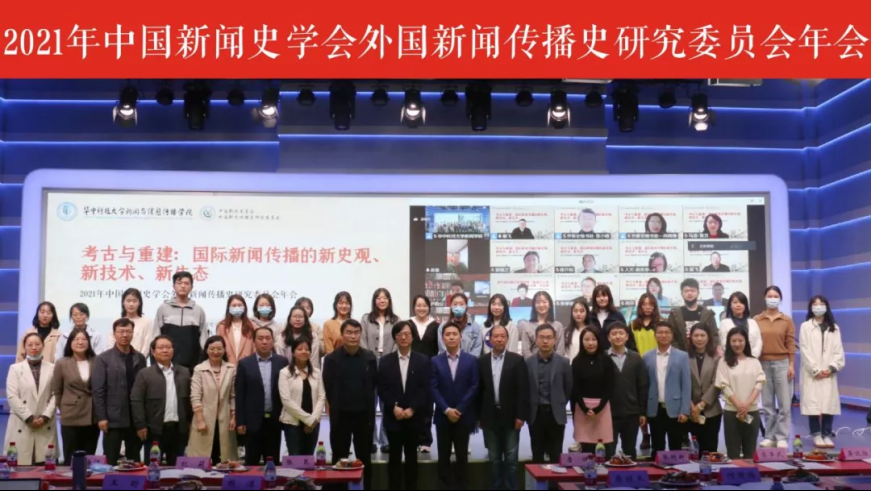
Photo of the 2021 Annual Convention of the CAGC,CAHJC
Affected by multiple factors such as the sudden and global spread of the COVID-19, the world is undergoing tremendous changes. Under the background of the coexistence of globalization and de-globalization, the strategic game between countries is intensifying and promoting profound changes in the international system. The confrontation in the international public opinion field has become more acute, and the competition for the discourse power has become more intense. In order to find a way out under tremendous changes, history is a mirror we must learn from. On November 6, the annual convention of the Chinese Association of Global Communication (CAGC), sponsored by the CAGC, Chinese Association for History of Journalism and Communication (CAHJC), and organized by the School of Journalism and Information Communication (SJIC), Huazhong University of Science and Technology (HUST), was held in Wuhan, Hubei. With the theme “Archaeology & Reconstruction: Convention for the New Historical Outlook, New Technology, and New Ecology of International Journalism and Communication”, the convention took the form of a combination of offline and online. Experts and scholars in international journalism and communication community, from Wuhan-based universities such as Wuhan University, Central China Normal University, Hubei University, South-Central University for Nationalities, and HUST gathered offline at the SJIC studio hall. Nearly 400 experts and scholars in the field of journalism and communication from universities across China gathered online to jointly explore solutions to the current dilemma of international communication, and open a new chapter for the future.
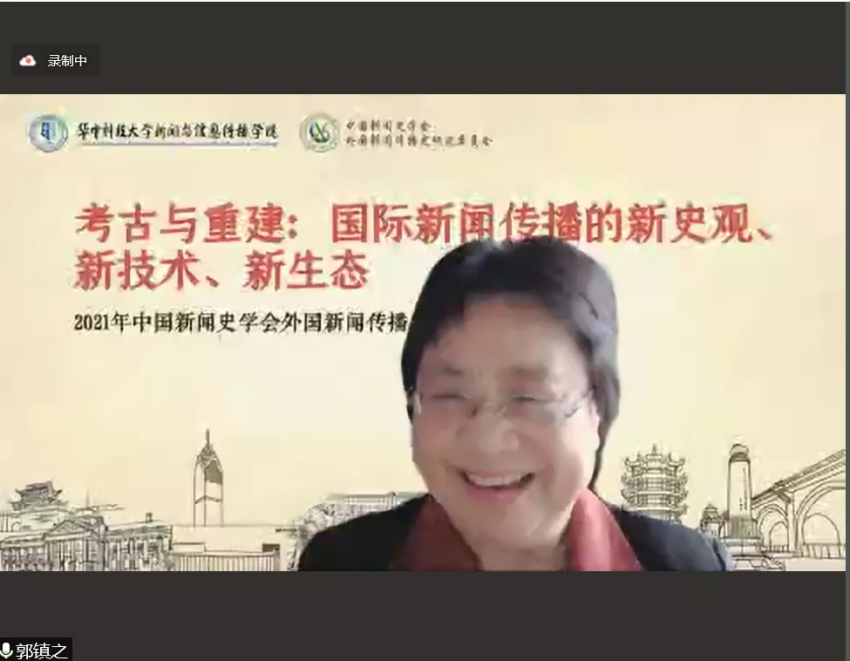
Guo Zhenzhi, first president of the CAGC, Professor of the School of Journalism and Communication, Tsinghua University
The opening ceremony of the convention was presided over by Zhan Jian, Chair of the SJIC Committee. Guo Zhenzhi, Professor of the School of Journalism and Communication, Tsinghua University, also the first president of the CAGC, spoke highly of the theme of the convention. She believed that in addition to the familiar mainstream topics such as international communication, cross-cultural communication, and information warfare, there were many interesting and valuable research topics in each sub-forum. She expected the participating scholars to jointly push the academic research of international communication and international exchanges to new heights.

Sun Youzhong, the second president of the CAGC, also the vice president of BFSU
Professor Sun Youzhong, the second president of the CAGC, also the vice president of Beijing Foreign Studies University (BFSU), said that the theme “Archaeology & Reconstruction” was a creative thinking dimension in journalism and communication. There were three prerequisites for the transition from cold war communication to community communication: facing common problems, based on common interests, and identifying common values. Among them, achieving the identification of common values was difficult, which was also the mission and the glory of the CAGC.
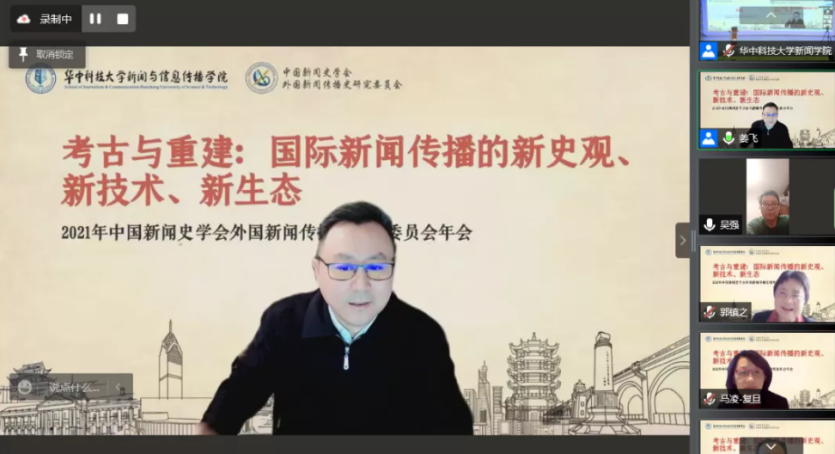
Jiang Fei, the current president of the CAGC, also the Dean of the School of International Journalism & Communication, BFSU
Professor Jiang Fei, the current president of the CAGC, also the Dean of the School of International Journalism & Communication, BFSU, combed the main work of the CAGC in the past year, including preparations for this annual convention and the sub-forum of the CAHJC. Meanwhile, he expressed his gratitude to the participating experts’ support and the cooperation of colleagues in the CAGC, and he also expressed expectations for the future work of the CAGC.
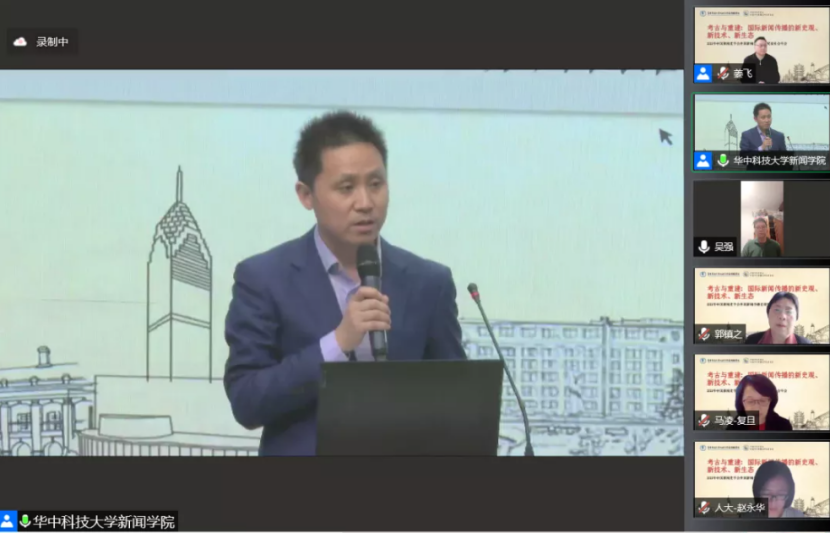
Zhang Mingxin, Dean of the SJIC, HUST
Professor Zhang Mingxin, Dean of the SJIC, HUST, said in his speech that, established in 2008, the CAGC was one of the secondary professional associations with longest history under the CAHJC, and it had made fruitful and outstanding achievements during these years. This year’s convention connected the past with the present, tracing the roots and growth mechanisms of the changes in the past century. It was of great significance to seek solutions to improve the efficacy of international communication.
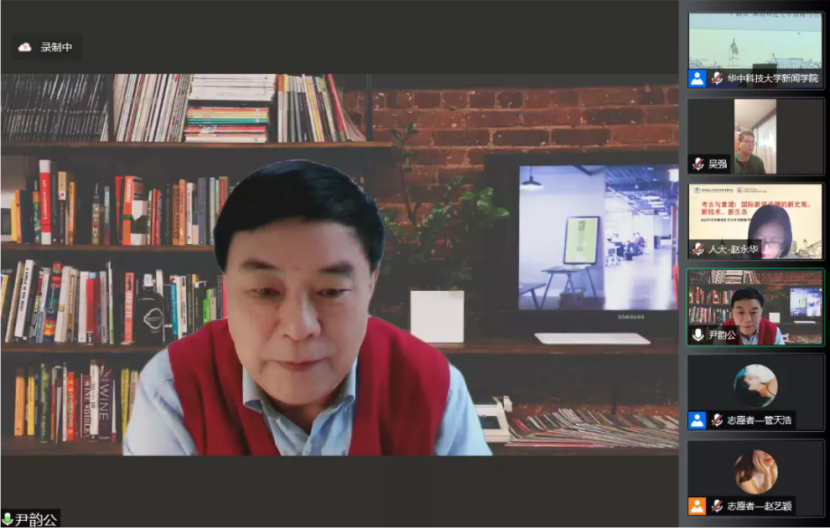
Yin Yungong, Dean of the School of Journalism and Communication, Hunan Normal University
“To improve the efficacy of international communication, it’s necessary to make China’s voice heard, and take into account both self-shaping and others-shaping”. Professor Yin Yungong, Dean of the School of Journalism and Communication, Hunan Normal University, delivered a speech “Thoughts on the Comprehensive Improvement of International Communication Efficacy”. He believed that from President Xi Jinping’s previous speeches, China’s international communication outlook had undergone a change from “promotion” to “improvement”, and from “effectiveness” to “efficacy”. Efficacy, as a new judgment and new expression of China’s international communication capabilities, was inseparable from the changes in the international situation and the strengthening of China’s strength. China’s international communication work began to focus on the overall optimization rather than the partial improvement of a certain aspect, aiming at the realization of systematic goals rather than a single goal.
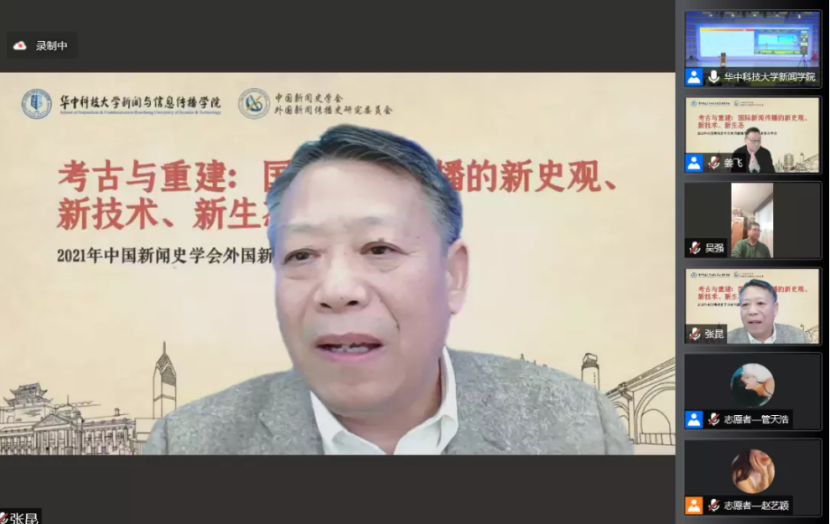
Zhang Kun, Dean of theInstitute of National Communication Strategy, HUST, also Distinguished Dean of the School of Journalism & Communication, Minzu University of China
“History courses of journalism and communication serve an medium between general education courses and professional practice courses, which can complement the humanities education related to majors. Such courses can expand students’ horizons and strengthen their historical insights, and are related to students’ outlook on life, values, and history.” Professor Zhang Kun, Dean of theInstitute of National Communication Strategy, HUST, also Distinguished Dean of the School of Journalism & Communication, Minzu University of China, delivered a keynote speech “Knowledge Construction of History Courses of Journalism and Communication”. Based on the problems existing in the current journalism history courses, Zhang proposed his curriculum design idea: first, to construct a curriculum system of journalism and communication with “subject basic courses + professional elective courses”; second, to design subject basic courses for all majors with global vision, international integration, ancient and modern integration, history and theory integration, and full media integration; third, to explore the design of professional elective courses such as media archaeology, media history, intellectual history, system history, national history, and chronological history.
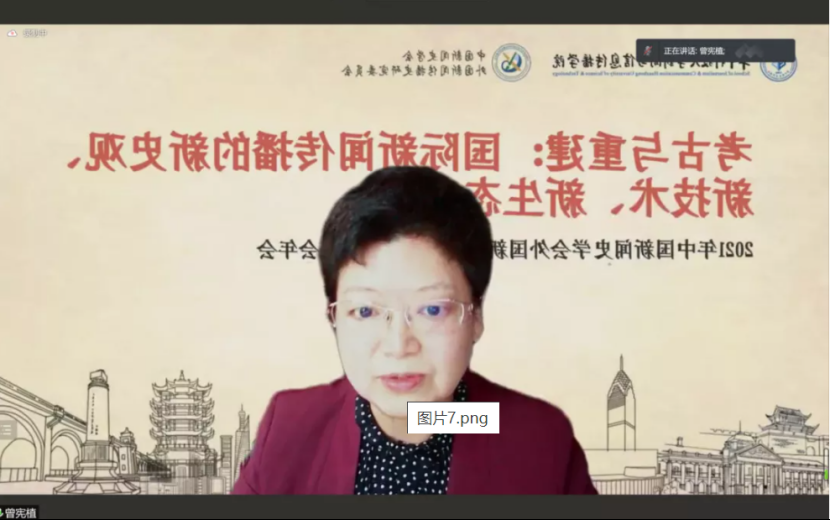
Cheng Manli, Dean of the National Institute of Strategic Communication, Peking University
Professor Cheng Manli, Dean of the National Institute of Strategic Communication, Peking University, shared her speech“International Communication of the Communist International” from four aspects. First, to lead the communication with clear ideas. The Communist International offered guidance to important issues such as the domestic racial issues in the United States, the land issue raised by the French Communist Party, and whether the European Communist Parties participated in parliamentary elections. Second, to lead the communication with rules and regulations. Some regulations in theConditions for Joining the Communist Internationalclearly stipulate the management of party newspapers and journals. Third, human-medium embedded communication. The Communist International relied on the Far East Bureau to adopt a human-medium embedded communication method. Fourth, to use publications for widespread communication, including theCommunist Internationalpublished by the Communist International, Soviet Russian newspapers and so on. Cheng believed that the international communication of the Communist International has promoted the development of the revolutionary cause, but some of its later mistakes also had a negative impact on the international Communist International movement.
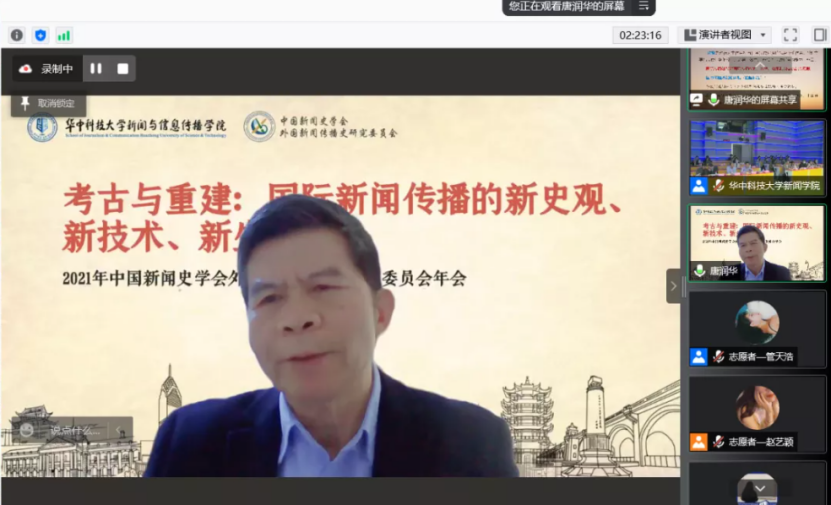
Tang Runhua, Distinguished Professor of Dalian University of Foreign Languages, also the chief researcher of the Research Center for Chinese Culture Overseas Communication
Tang Runhua, Distinguished Professor of Dalian University of Foreign Languages, also the chief researcher of the Research Center for Chinese Culture Overseas Communication, delivered a keynote speech entitled “Three Levels of Comprehensive Improvement of the Efficacy of International Communication”. Professor Tang interpreted the connotation of international communication efficacy as two aspects: the efficiency, effectiveness, and benefit of completing tasks; the ability and quality of completing tasks. He believed that efforts should be made from the macro, meso, and micro levels at the same time: at the macro-strategy level, to catalyze synergistic effects through overall communication, promote the universalization of the main body of communication, and integrate communication management; at the meso-idea level, to promote empathy communication to achieve the goal, the communication concept must follow the common values of mankind, and the communication content must respond to the common concerns of mankind; at the micro-tactic level, to adopt precise communication to enhance the communication effectiveness, and adopt different communication tactics targeting different communication subjects, audiences and forms.
“Analysis and decoding of the ‘China problem’ will become the key to global development exploring the ‘different choices of modernity’.” Professor Shi Anbin, Vice Dean of the School of Journalism and Communication, Tsinghua University, delivered a speech entitled “Decoding the ‘China Problem’ in International Communication: Based on Analysis of ACGT Mode”. He believed that the ‘China Problem’ should be regarded as a paradigm, focusing on the ‘China Problem’ in international communication, and emphasizing the new perspective of the “World from China’s view”. Based on this, Professor Shi proposed the ACGT model, and believed that China’s international communication practice should rely on the Digital Silk Road, cater to the local context with “trans-cultural thinking”, provide global public products, practice “common good”, and shape global influence with “tolerant globalization”, promote China’s technology and governance standards to go global with “technology sharing”, and bridge the global “digital divide” between the North and the South.
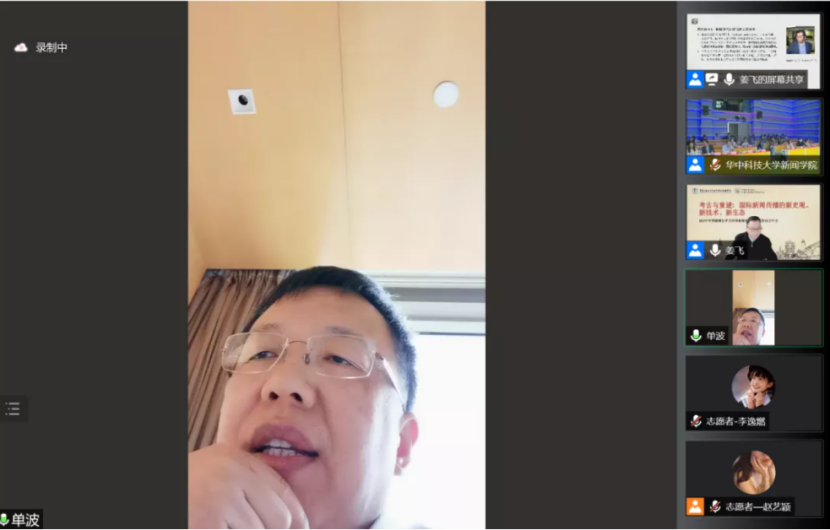
Shan Bo, Professor of the School of Journalism and Communication, also the director of the Media Development Research Center, Wuhan University
“The mission of comparative research is to reveal the existence of communication relations and the existing communication relations. The reconstruction of comparative journalism should return to the logic of comparison, that is, to gather together as equals and respect each other’s differences.” Shan Bo, Professor of the School of Journalism and Communication, also the director of the Media Development Research Center, Wuhan University, shared a keynote speech entitled “Comparative Journalism from the Perspective of Glocalization”. Professor Shan put forward several thoughts on how to reconstruct comparative journalism based on the construction of the relationship between the global and the local: first, de-westernized journalism comparison, including breaking the stereotype of modern comparison, reflecting on and deconstructing the “South-North” binary opposition journalism communication power relations, constructing a “global south” perspective, focusing on the global flow and anti-flow of media content; second, re-westernized journalism comparison, the new possibility of the world universalism as a new solution to the conflicts between the East and the West, the “re-westernization” theory should strive to expand the scope of interpretation and seek to explain the power of global journalism; third, contextualized journalism comparison, which can be divided into three research paths: objective context, subjective context, and relational context.
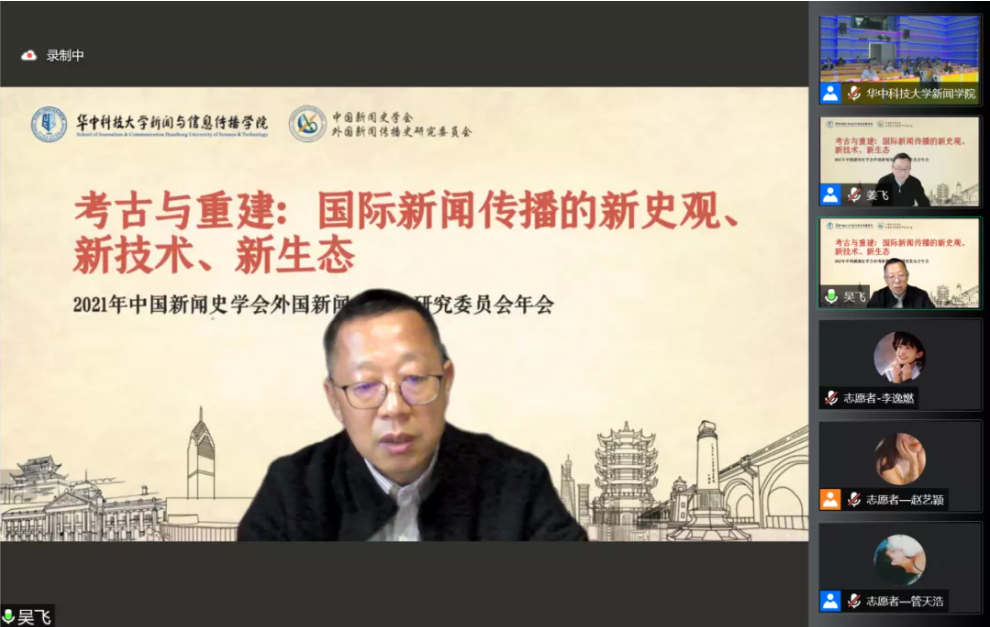
Wu Fei, Distinguished Professor of Zhejiang University
Wu Fei, Distinguished Professor of Zhejiang University, gave a speech titled “The Crisis and Reconstruction of Public Communication in the Digital Era”. Professor Wu believed that the public sphere in the digital era should pay attention to the important role of communication technology. Diverse actors in the digital era have difficulty in reaching consensus, which posed challenge to the traditional concept of community. Wu took the decline in the trust of Chinese and American traditional media during the epidemic as an example to explain the lack of trust and social tearing in the digital public space. The new media technology platforms were filled with a lot of hateful, angry, and prejudiced emotional contents. Freedom and order were in trouble. The diversified space can speak for the disadvantaged, but it may also lead to social fragmentation. A lot of researches on the digital divide had revealed this inequality problem.
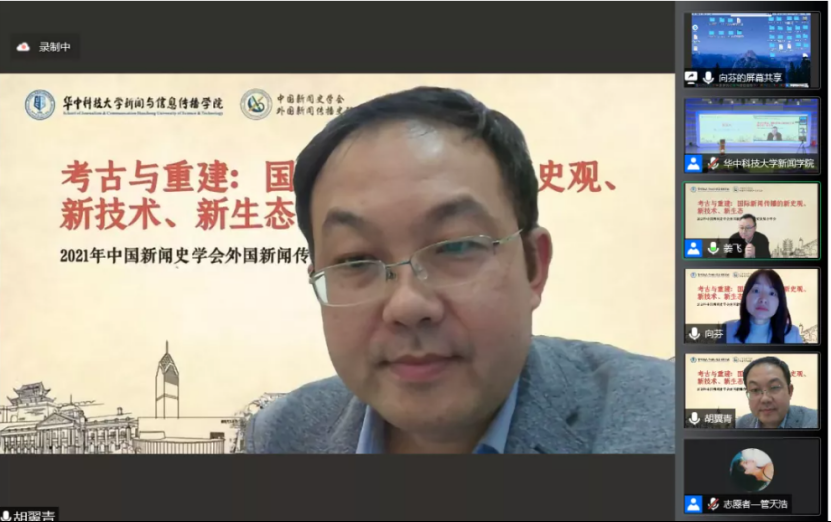
Hu Yiqing, Vice Dean of the School of Journalism and Communication, Nanjing University
Professor Hu Yiqing, Vice Dean of the School of Journalism and Communication, Nanjing University, gave a speech titled “Dallas Smythe and the International Communication View of the Political Economy of Communication”. Professor Hu pointed out that Dallas Smythe’s international outlook was embodied in the relationship between the mass media and the ideological industry. It was through the ideological industry that the United States dominated the entire world. Smythe knew that media communication technology played a very important role in the ideological industry, but he just avoided this problem in his research, thus planting the bane of the political economy of communication, causing the research in this context to focus only on the role of politics and economy, while ignoring the importance of media technology.
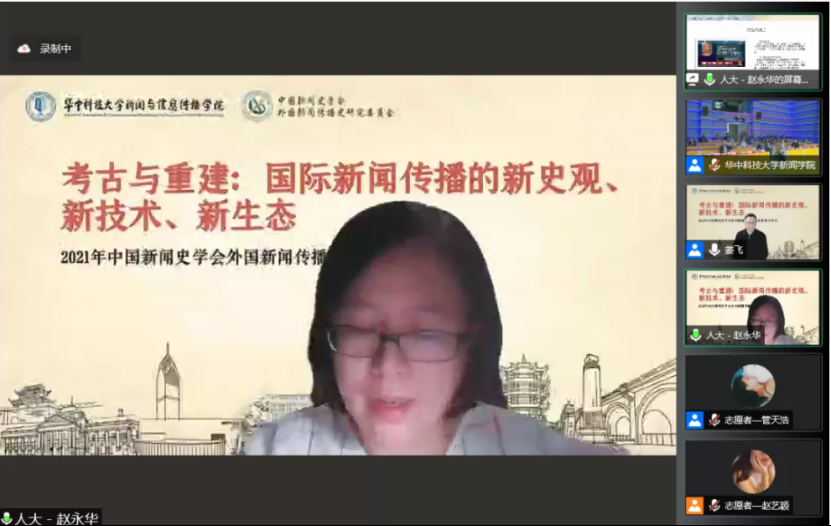
Zhao Yonghua, Professor of the School of Journalism, Renmin University of China
“International fake news is a phenomenon that occurs during the spread of news across nations, including unfounded fake news and factually based fake news with some elements that are inaccurate, as well as false information disseminated online in the age of social media.” Zhao Yonghua, Professor of the School of Journalism, Renmin University of China, gave a speech titled “Information Warfare in the Social Media Era: Calculated International Fake News.” Professor Zhao believed that an important reason for the large-scale emergence of international fake news was information warfare. Computing propaganda used algorithms, automation, and big data analysis to manipulate public opinion in order to deliberately spread misleading information on social media networks. Zhao pointed out that national actors, international organizations, social media platforms, and users must collaborate to establish a global governance framework to deal with the new information warfare characterized by computing propaganda. As for China, it was necessary to start with upgrading technology, studying and judging public opinion related to China, and developing international cooperation.
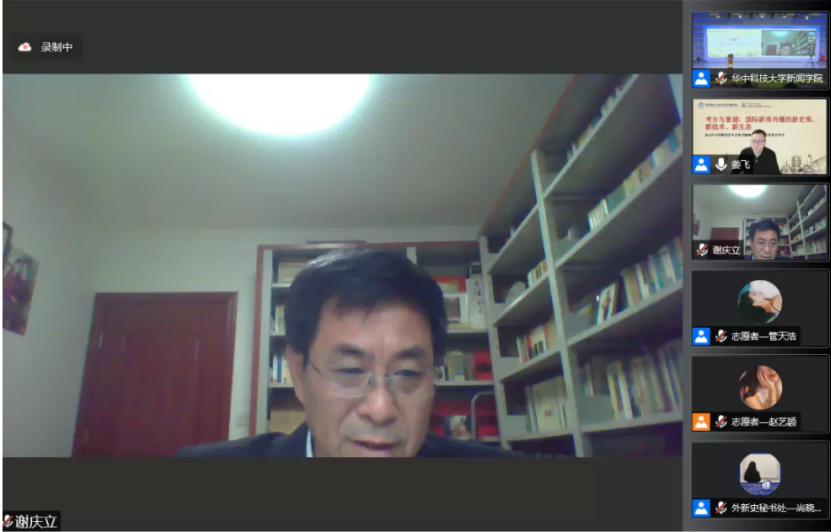
Xie Qingli, Professor of the School of International Journalism & Communication, BFSU
Xie Qingli, Professor of the School of International Journalism & Communication, BFSU, gave a speech on the topic of “The Barbarian (Man Yi) Debate: Media Issues Archaeology of Foreign English Newspapers in Early China”. Professor Xie shared the early history of the use of the Chinese character “Yi” in Foreign English Newspaper in China. Around the Chinese character “Yi”, the Foreign English Newspaper in China had reported and discussed it for several years in the early 19th century. The original connotation of “Yi” was overturned, and its meaning was reconstructed by the West. Xie believed that through the “barbarian debate” that lasted for several years, the Foreign English Newspaper in China not only achieved the goal to beautify the West, but also placed China in a barbaric position, which intensified China’s negative image in the West. Foreign English newspaper in China participated in the reconstruction of the image of China during this period, and replaced China’s discourse power in spreading China’s image to the West.
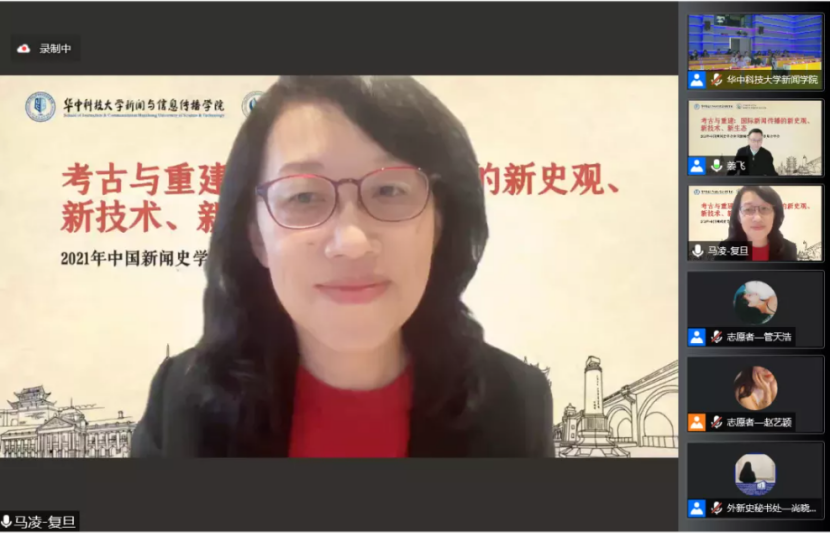
Ma Ling, Professor of the School of Journalism, Fudan University
Ma Ling, Professor of the School of Journalism, Fudan University, delivered a speech titled “Museums as Media: A Method of International Communication in the New Era”. Professor Ma pointed out that since the new era, Chinese museums had served as the media, and played an important role in the process of constructing national history, strengthening citizen identity, spreading national cultural images, and shaping the community of shared future for mankind. International exhibitions had changed from a single culture to the narrative communication of multi-cultural integration and mutual learning. Under the treacherous international political situation, new museums could break through the deadlock of traditional media in international exchanges, and promote the construction of an international communication system with Chinese characteristics featuring “exchanges and mutual learning among civilizations”.
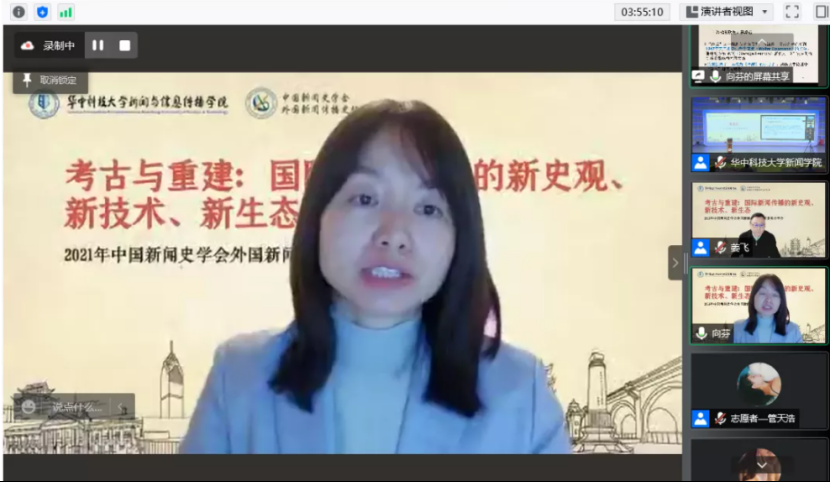
Xiang Fen, researcher at the Institute of Journalism and Communication, Chinese Academy of Social Sciences
Xiang Fen, a researcher at the Institute of Journalism and Communication, Chinese Academy of Social Sciences, gave a speech on the topic of “Discourse Production, Power Operation and Knowledge Transmission in the Cold War View”. From the perspective of knowledge communication, Xiang presented the evolution of Cold War research factions in academia. The discourse production and knowledge communication of the Cold War view reflected that Western discourses and doctrines had always been in a superior position through political manipulation, media influence, and academic proofs, while China had always been in a follow-up position. Xiang believed that we needed to understand the specific context of discourse, distinguish discourse traps, examine discourse value positions, clarify discourse thinking, form a subjective discourse symbol and cognitive framework, and enhance China’s discourse power in international affairs.

Photo of participating scholars
After the keynote forum, four sub-forums, with themes such as “ New Historical Outlook and New Technology of International Journalism and Communication” and “International Communication Theory and Practice Innovation”, were held via the Tencent Meeting in the afternoon. The sub-forums were hosted by Gu Xiaojin, Distinguished Professor of the School of Communication, Shenzhen University, Ji Li, Professor of the School of Journalism and Communication, Wuhan University, Luo Zhenglin, Professor of the School of Journalism and Communication, Nanjing Normal University, and Professor Su Hongyuan, Dean of the School of Journalism and Communication, South China University of Technology. Chen Kaihe, Professor of the School of Journalism and Communication, Peking University, Ma Ling, Professor of the School of Journalism, Fudan University, Shen Hui, Professor of the School of Journalism and Communication, Shanghai University, and Chen Wei, Associate Professor of the SJIC, HUST, made some comments on these forums. More than 30 scholars, from media outlets and universities such as Xinhua News Agency, China Media Group, Renmin University of China, Communication University of China, Nanjing University, Zhejiang University, Jinan University, Wuhan University, Beijing Foreign Studies University, and HUST delivered keynote speeches, and more than 400 participants joined the convention online.
The closing ceremony of the convention was presided over by Professor Tang Haijiang, Vice Dean of the SJIC, HUST. The reviewers of the sub-forums made some summaries respectively. Professor Ma Ling, on behalf of the organizer of the next year’s convention, School of Journalism, Fudan University, extended a kind invitation to everyone and looked forward to gathering in Shanghai in the coming year. Professor Tang said that he was deeply moved by the free, enthusiastic, and tolerant academic atmosphere of the CAGC, and expected scholars tobrave the winds and wavesand produce more academic results in the field of international communication.


 WeChat
WeChat